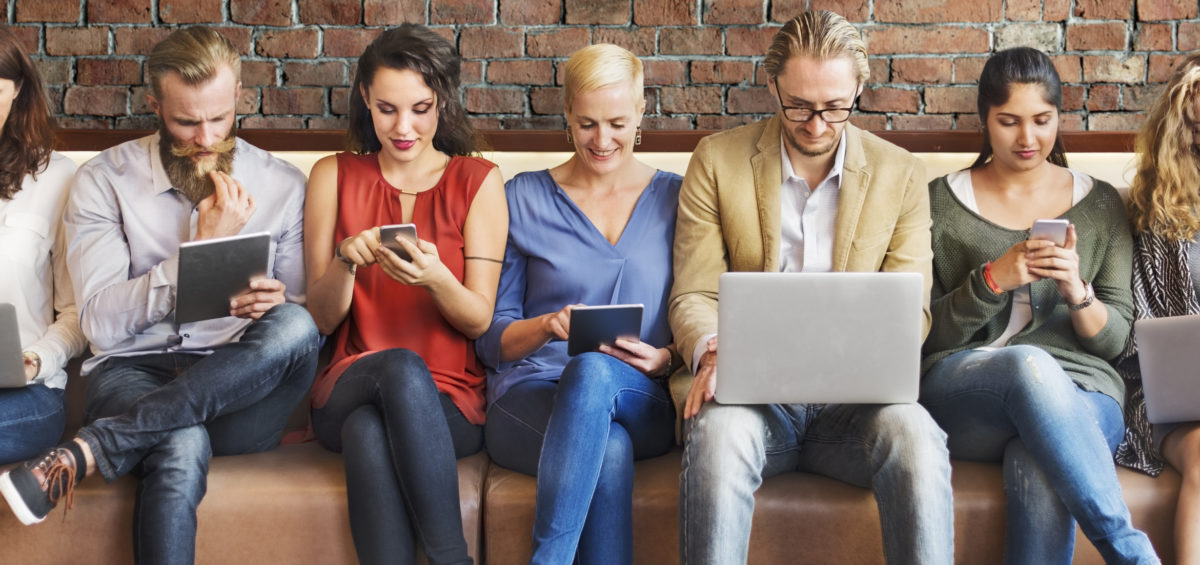
Does this sound familiar – you’ve just found an awesome event while scrolling through Facebook, texting your friends, sharing your day on Instagram, checking your emails and binge watching your favourite new TV show?
We can’t refute it, digital technology and social media have firmly cemented their places in each of our modern lives.
But whilst all this connection has infinite information and entertainment just a Google away, we also can’t deny having such easy access to the digital world comes with its downsides.
When it comes to excessive digital technology and social media use, some of the associated side effects include:
Depression:
- In a survey of over 1000 students, 22% of teenagers were logging onto social media at least 10 times per day, which increased their susceptibility to depression.[1]
- In adults, high exposure to social media also made individuals more prone to poor mood and depression, compared to than those with low exposure.[2]
In a survey of over 1000 students, 22% of teenagers were logging onto social media at least 10 times per day, which increased their susceptibility to depression.[1]
Sleep issues:
- The frequent use of mobile phones has been associated with sleep disturbances,[3] especially pertinent for people who are exposed to TV, phone, tablet or computer screens in the hours close to bed time.
Impaired concentration:
- “Media multitasking” is something many of us are guilty of, and is when you use multiple digital devices at the same time. This could look like checking Facebook and playing a game on your phone whilst watching TV, and has been linked with reduced concentration, focus and an inability to block out distractions.[4]
Reduced connection
- All this time plugged into technology can then lead to fewer interactions with the people around us. The leads to a reduction in social bonding, connection with community, and an overall sense of happiness and wellbeing.[5]
All this time plugged into technology can then lead to fewer interactions with the people around us. The leads to a reduction in social bonding, connection with community, and an overall sense of happiness and wellbeing.[5]

Whilst we can no longer deny the negative impacts digital devices are having on our overall health, you don’t have to go off the grid or back into the Stone Age.
Rather than having technology dictate your day, you can balance it with fun, socialising, connection, spending time in nature, and restorative rest by using the following six ways to disconnect:
- Start your morning media free. Set a time for when digital or social media use starts for the day, which may mean no phone, computer, TV or radio until you are on the train or bus, or when you arrive at work or school.
- Limit your screen time. There are multiple software options for phones and computers that you can use for this, which will block your access to designated websites or Apps after a certain amount of use or time of day. This is especially useful to engage 2 hours before your bedtime, to prevent the exposure to blue light disrupting your body clock.
- Utilise aeroplane mode. Turn on aeroplane mode before bed each night to ensure you aren’t disturbed by notifications or calls, allowing your body to enter a restful sleep. Additionally, think about using aeroplane mode when spending time with your loved ones so you can enjoy quality connection without distraction.
- Swap your screen time. What else will bring you joy, contentment and connection? Find a walking buddy, start a technology-free hobby or find a reading list to tackle.
- Set boundaries between work and play: This means no checking work emails or projects outside work hours or weekends, giving yourself vital time to unplug and your nervous system reset.
- Get involved in your local community. To bolster that in person social bonding, help out at a local soup kitchen, animal shelter or charity. Not only will it cut down on screen time, but you’ll also have fun and feel good whilst helping others.
Think about using aeroplane mode when spending time with your loved ones so you can enjoy quality connection without distraction.
Happiness, Focus and Connection Awaits
Could your digital media use be impacting your mood, sleep or overall wellbeing? Can you identify any ways you could reduce your use, starting with even 10 or 20 minutes? With any extra time you get back, you’ll instead be able to engage and be more present with your passions, hobbies, loved ones and wider community. Commit to implementing one of the tips above in the next week, and prepare to reap the benefits!
By Nicolla Callan
[1] Punamäki RL, Wallenius M, Nygård CH, Saarni L, Rimpelä A. Use of information and communication technology (ICT) and perceived health in adolescence: the role of sleeping habits and waking-time tiredness. J Adolesc. 2007 Aug;30(4):569-85. PMID: 16979753.
[2] Lin LY, Sidani JE, Shensa A, Radovic A, Miller E, Colditz JB, et al. Association between social media use and depression among US young adults. Depress anxiety. 2016 Apr;33(4):323-31. doi: 10.1002/da.22466
[3] O’Keeffe GS, Clarke-Pearson K; Council on Communications and Media. The impact of social media on children, adolescents, and families. Pediatrics. 2011 Apr;127(4):800-4. doi: 10.1542/peds.2011-0054.
[4] Becker MW, Alzahabi R, Hopwood CJ. Media multitasking is associated with symptoms of depression and social anxiety. Cyberpsychol Behav Soc Netw. 2013 Feb;16(2):132-5. doi: 10.1089/cyber.2012.0291
[5] Lin LY, Sidani JE, Shensa A, Radovic A, Miller E, Colditz JB, et al. Association between social media use and depression among US young adults. Depress anxiety. 2016 Apr;33(4):323-31. doi: 10.1002/da.22466
https://blog.metagenics.com.au/6-ways-to-disconnect-from-a-connected-world/
